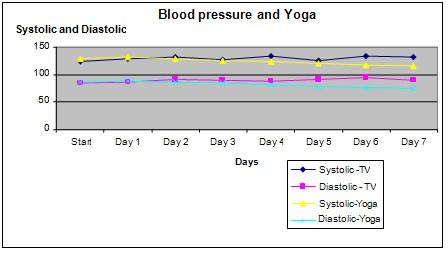| Complexity level: | 7 |
| Project cost ($): | 70 |
| Time required: | 2 hour to prepare, 7 days for observation |
| Material availability: | You will need to either borrow or purchase a blood pressure monitor |
| Safety concerns: | None |
Hypothesis
Persons who have been practising yoga will have reduced blood pressure.
Overview
Yoga and hypertension
Blood flows in the human body with a certain amount of pressure. Lifestyle and eating habits can change the blood pressure levels in the body. Blood pressure in a person can also increase due to stress, anxiety, fear, worry and many other causes.
When the blood pressure of a person is too high, the person is said to have high blood pressure or hypertension. If the blood pressure is low, then the person will have hypotension.
The blood pressure of a person is normally measured at the arm. The blood pressure caused by the contraction of the heart is called systolic pressure and the pressure when the heart expands is called diastolic pressure. The systolic reading is normally higher then the diastolic and the systolic/diastolic readings for a healthy person is 120/80.
The practice of yoga consists of physical exercises, breathing exercises and meditation. The practice of yoga has been proven to have many health benefits. The person practising yoga is able to relax and calm the mind and this reduces the adrenaline levels and lowers the blood pressure.
Scientific Terms
Materials
The materials required for this science fair project:
- 1 yoga instructor
- 1 television set
- 20 male participants between aged 35 to 45 years.
- Portable wrist blood pressure monitor
Procedure
1. For this experiment, the independent variable is whether the participant is watching television or practising yoga. The dependent variable is the blood pressure of the tested individual. This is determined by using the portable wrist blood pressure monitor to measure his blood pressure. The constants (control variables) are the length of time for watching television or practising yoga, the age group of participants and gender of the participants.
2. The blood pressures of all the 20 participants are measured using the portable wrist blood pressure monitor. They are divided into 2 groups so that the average blood pressure of each group will be about the same.
3. The 1st group of 10 participants is made to watch television everyday for 2 hours. Immediately after the 2-hour viewing session is completed their blood pressure is checked using the portable wrist blood pressure monitor. Their average blood pressure reading is recorded in the table given below.
4. The 2nd group of 10 participants is led through a yoga session by the instructor. They are made to practise yoga everyday for 2 hours. The training session consists of some yoga exercises and breathing exercises for 1 hour followed by 1 hour of meditation. Immediately after the session their blood pressure is checked using the portable wrist blood pressure monitor. Their average blood pressure reading is recorded in the table given below.
5. Procedures 3 and 4 are repeated for the next 7 days and all their average blood pressures are recorded in the table below.

Results
The participants in group 1 who were watching television for 2 hours demonstrated a slight increase in blood pressure levels but the participants in group 2 who were practising yoga started to demonstrate a decline in blood pressure after a few days.
Group |
Measured |
Average blood pressure reading for 10 persons |
|||||||
Start |
Day 1 |
Day 2 |
Day 3 |
Day 4 |
Day 5 |
Day 6 |
Day 7 |
||
1 – television |
Systolic |
124 |
128 |
132 |
127 |
133 |
126 |
133 |
132 |
Diastolic |
84 |
86 |
92 |
90 |
88 |
92 |
94 |
89 |
|
2 - yoga |
Systolic |
128 |
132 |
129 |
126 |
124 |
121 |
118 |
115 |
Diastolic |
86 |
88 |
87 |
85 |
82 |
79 |
77 |
75 |
The graph below represents the results of our science project experiment.

Conclusion
The hypothesis that persons who have been practising yoga will have reduced blood pressure is proven to be true.
The use of yoga to heal ailments has been in practice for centuries in India. Currently the culture of practising yoga has spread to the western world. Daily work and social pressures have caused many people to lead stressful lives leading to various health and mental problems. The practice of yoga enables the mind and the body to reducee stress, maintain calmness and allow the body to recuperate naturally.
Also consider
The experiment can also be done using different age group or female participants.
Try to compare the blood pressure with other activities like listening to soft music, aroma therapy or practicing tai chi.
References
Yoga for blood pressure - http://www.yogapoint.com/yogatherapy/bloodpressure1.htm
Effect of yoga on blood pressure - http://www.yogapoint.com/therapy/hypertension_yoga.htm

